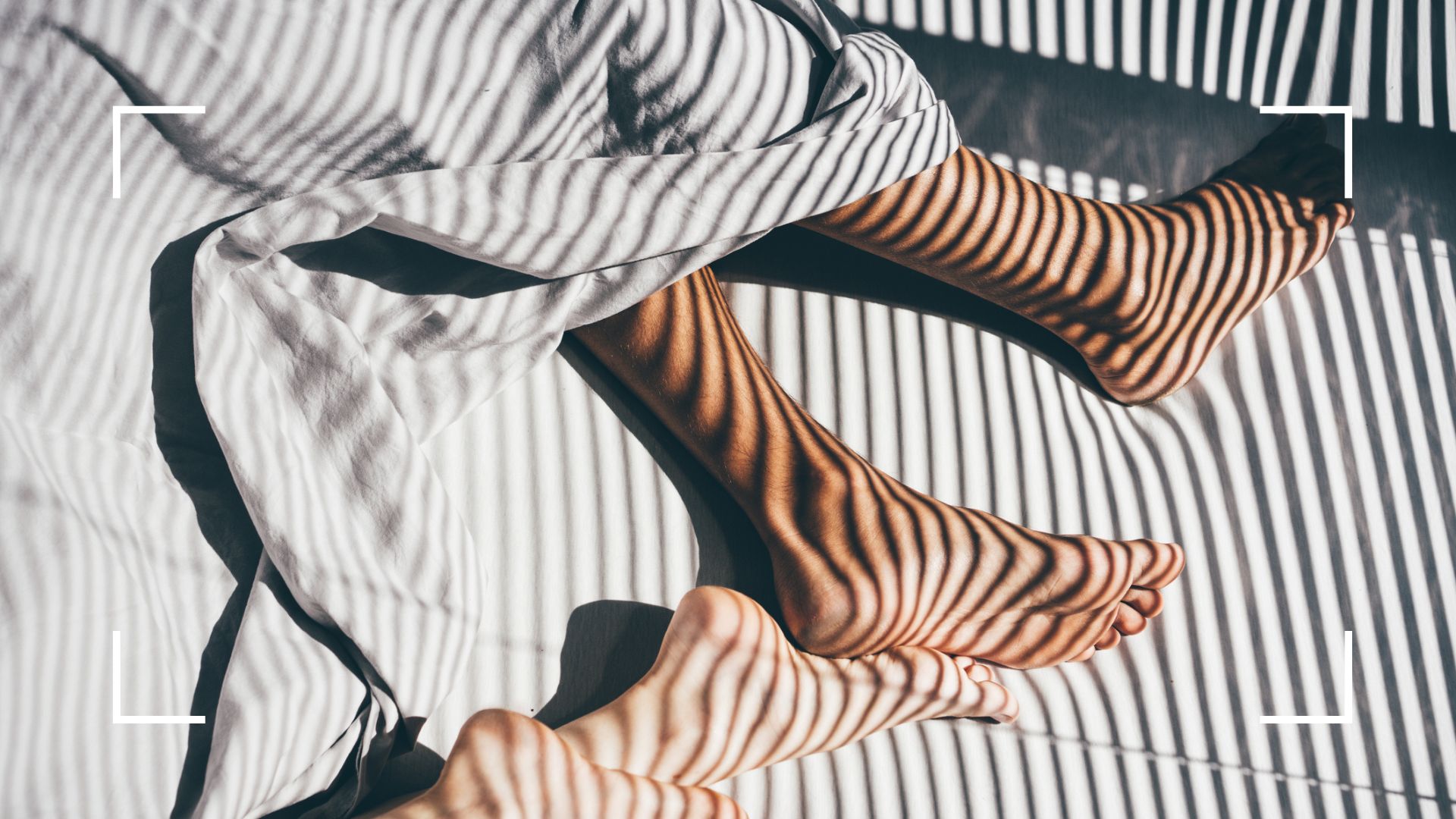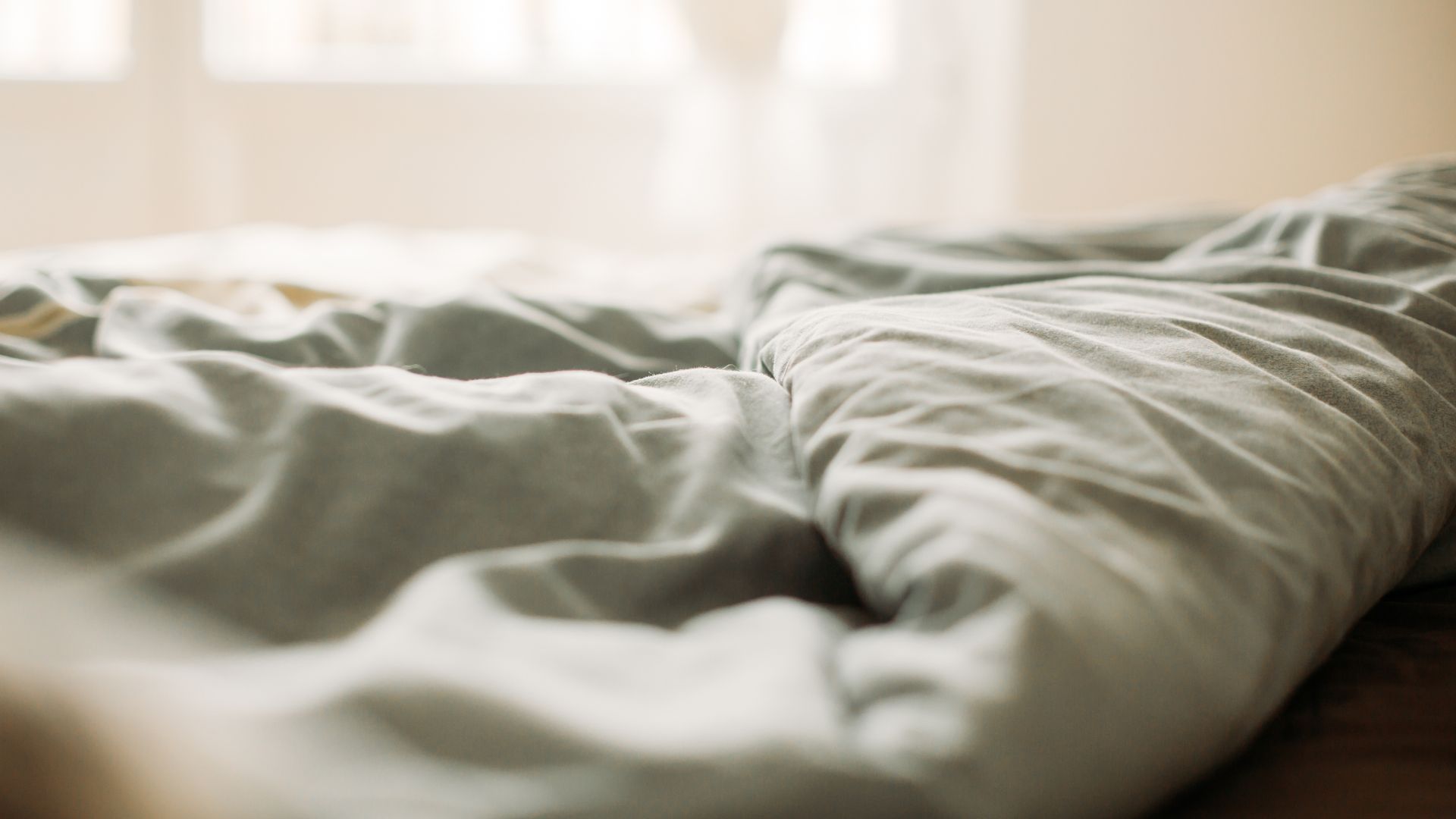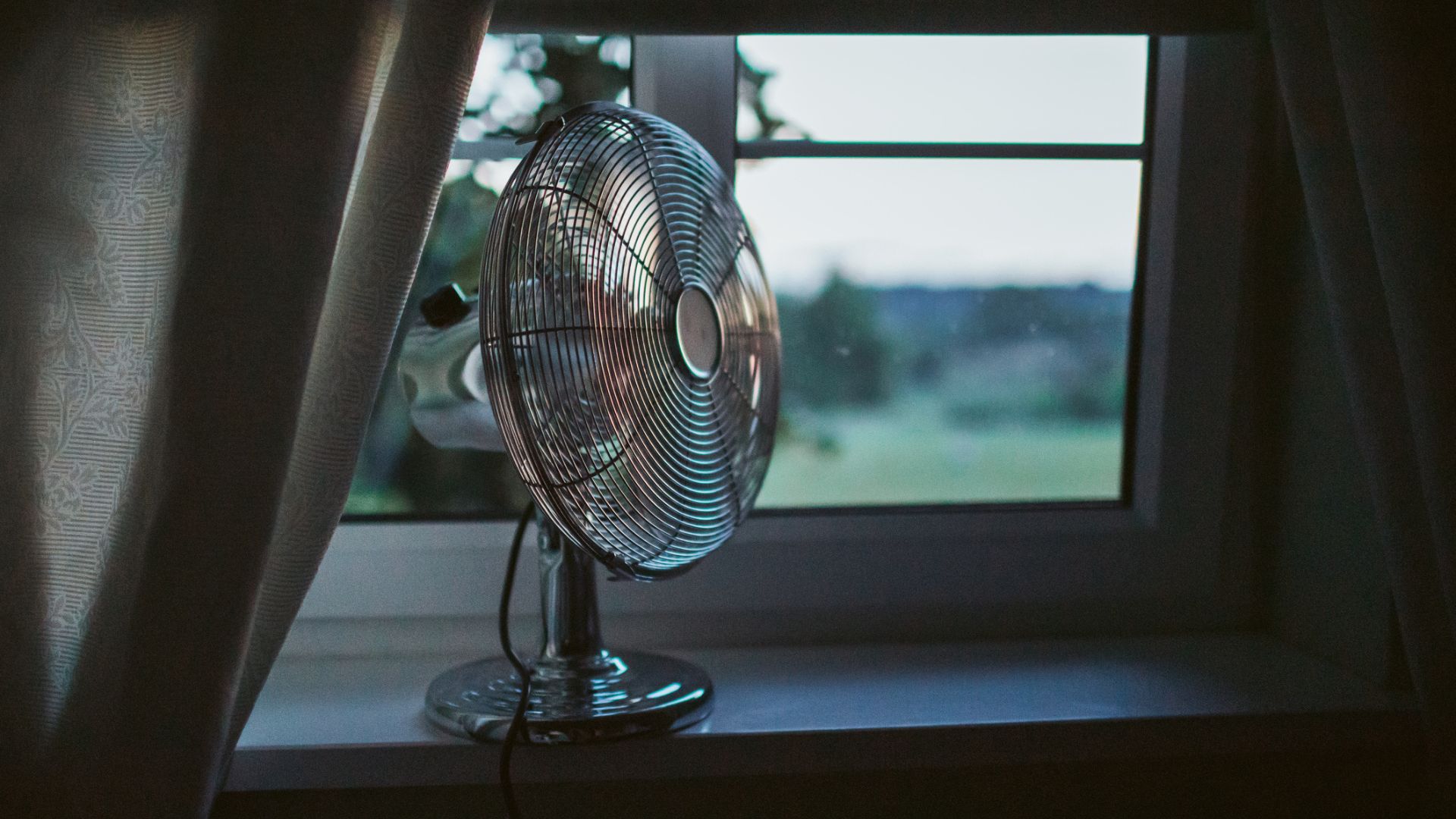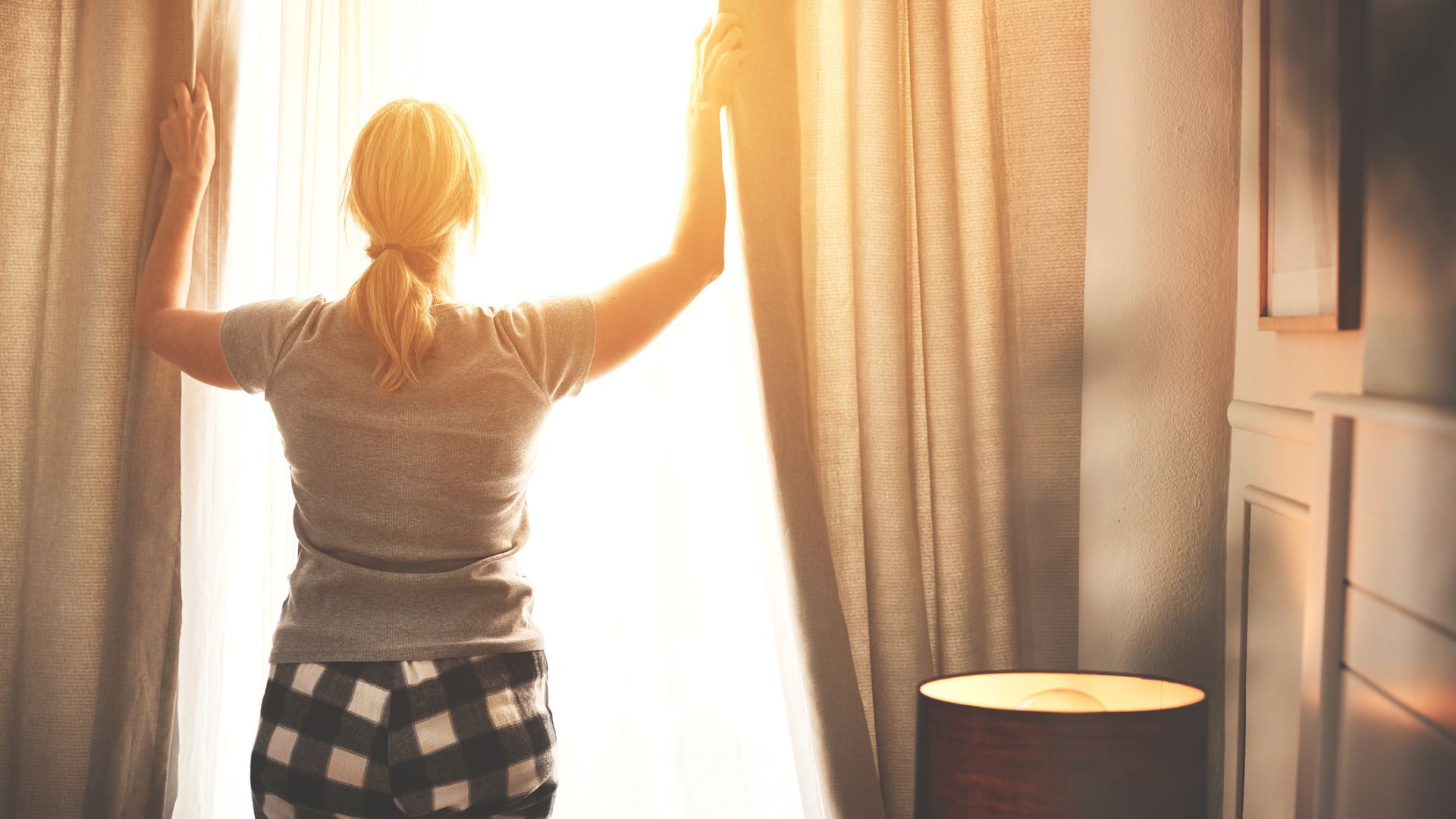How to sleep in the heat: 21 tips to try when it's too hot outside
It can be hard to know how to sleep in the heat, so here sleep specialists, nutritionists, and doctors tell us how to do it best


We're all still looking to know how to sleep in the heat better as the warm weather stretches into September. Summer after summer we pull out fans and try to keep our spaces cool, but there's no guarantee it'll work. The combination of sticky heat and unprepared bedrooms can wreak havoc with our sleep schedules - but luckily, there are a couple of tricks you can try to cool down at night.
Lying awake in bed, throwing the comforter off, and then pulling it back on again, legs off the mattress, then back on. Plus, with the addition of chart-topping pollen counts in 2023, it's not exactly like you can just open a window. Trying to sleep in the heat is an uncomfortable experience, without a doubt (our editor has tried the top-rated handheld fans on Amazon, which provide some light relief).
Yet it is possible to get a good night’s sleep this summer, fall asleep fast, and even beat the temperatures during the day if you're wondering why heat makes you tired to begin with. Here, several sleep experts, nutritionists, and sleep scientists reveal how to sleep in the heat and sleep hacks to be aware of.
How to sleep in the heat
1. Have a hot shower
This seems like the last thing you should be doing if you're looking for how to cool down in a heatwave, but sleep specialist Dr Greg Potter swears by it if you want to know how to sleep in the heat. “Unless it’s very hot outside, have a 10-minute hot shower one to two hours before bed,” he suggests. It works to cool you down because near the end of the day, there’s a fall in the temperature of your core, including your brain, which helps you fall and stay asleep.
“Counterintuitively, this fall is related to a rise in your skin temperature in the evening, which results from increased blood flow to your extremities,” he says. “This speeds heat loss to the environment. So it makes sense to warm your skin in the hours before bed but then to sleep in a cool, well-ventilated room.”
2. Keep the windows open
While there’s an argument for closing the windows and sticking to other cooling techniques, especially if you’re suffering in allergy season, it’s one of the best ways to make sure that you’re at least getting a bit of breeze into the bedroom.
“Before and during sleep, keep the windows open. If it’s noisy outside, you might benefit from earplugs,” suggests Dr Potter, the chief science officer at Resilient Nutrition.
Sign up to our free daily email for the latest royal and entertainment news, interesting opinion, expert advice on styling and beauty trends, and no-nonsense guides to the health and wellness questions you want answered.

3. Turn off the lights and your devices
About an hour before you go to bed, turn off the lights and any electronics in your room. While they may only push out a small amount of heat, everything makes a difference when you're trying to sleep in the heat.
"Plugged-in devices and lightbulbs emit heat and contribute to the overall temperature of a room," says Suzy Reading, sleep expert and chartered psychologist. "Turning everything off is better for the environment and prevents stimulating blue light, which can make you feel more awake. Remove all laptops, screens, and phones from your bedroom to avoid distraction should you wake up in the night."
4. Drink plenty of water
We all know that water is an essential nutrient for the body but when it comes to the hot weather, it’s more important than ever to stay hydrated - even during the night.
But as Alison Jones, certified sleep consultant, says, “Not only does staying properly hydrated help to lubricate the joints and cushion sensitive tissues throughout the night, it can also help you attain the drop in core body temperature that helps induce sleepiness, according to a study by the University of North Carolina.”
To make sure this happens, Alison suggests keeping a small glass of water on your bedside table or one of the best water bottles with a lid filled up.
5. Work on your sleep routine
Sometimes, learning how to sleep better in the heat is as much a psychological process as a physical one so get your mind in tune for a good night's sleep by establishing a solid cool-down routine.
"Feeling clammy and sticky is guaranteed to prevent you from feeling comfortable in bed," says Reading, who is also the resident sleep expert at Tempur. "Keep the temperature low and leave hair damp to keep you cooler for longer. Magnesium lotion is one of the best sleep aids as it has a cooling agent that helps to improve rest and recovery, and it's perfect for helping you nod off."
6. Stick to your normal sleep schedule
Hot weather can encourage us to change our sleep schedules - maybe going to bed later than we otherwise would as the temperature gets cooler, heading to bed earlier as we're tired from the excess energy used during the day, or napping throughout the day to make up for a bad night's sleep. But avoid doing so if you can and try to go to sleep at the same time every night.
Research from Taipei Medical University Hospital shows that the more inconsistent our sleeping patterns are, the more likely we are to suffer from interrupted sleep going forward and even adverse health outcomes overall.
7. Keep your hands and feet out of the covers
The secret behind regulating your body temperature is keeping your body warm, but hitting core pulse points such as your head, neck, and wrists, Alison explains. Not only will this make you feel cooler in that moment, but keeping these extremities out of the covers will help you with how to get back to sleep if you wake up in the middle of the night as you won’t be too warm.
“By keeping those key areas cooler, and away from the heat of the covers, it will help lower your core temperature,” she says.
8. Apply a wet flannel to pressure points
If your AC isn’t working and your fan hasn’t arrived yet, why not go old school? Another great way to cool down is running cold water over a flannel and resting it on these key areas, says Jones, who is also an expert at Sealy.
“Applying a cold flannel to your head, neck and wrists will rapidly reduce body heat by effectively cooling the blood circulating around your body, helping you to feel cooler, faster.”

9. Choose a different duvet
If you want to have a comforter (otherwise known as a duvet) in the summer, opting for a hot weather-appropriate one is a good idea. Many of the best duvets are suitable for both the colder and warmer months, bridging the gap between seasons.
“If you use a duvet in the summer, choose a cool one,” Dr Potter says. “Get one with a tog rating of less than five, for instance. If that’s still too warm or you don’t want to buy another duvet, try using just the cover and keep the inner handy in case you get too cool.”
10. Take a look at your mattress
While not everyone will be able to afford a new mattress as soon as the temperature changes, it’s worth looking into a heat-appropriate one if you’re due for an upgrade anyway.
“Use a mattress and pillow that wicks away heat and sweat. In general, spring and hybrid mattresses are better at this than foam ones, and pillows should be made from breathable materials. If you’re going to upgrade your mattress or pillows, get ones with a free trial period,” says Dr Potter.
And whatever you do, avoid traditional memory foam mattresses. “These are known to come with real heat problems,” says Phil Lawlor, a sleep technology expert and mattress designer. “There’s nowhere for your body heat to escape to and no ventilation. Mattresses with open structured memory foam springs have been proven to make the mattress eight times more breathable than other mattresses,” he says.
“So if you are a hot sleeper, or just find it hard to get to sleep during summer months, this is really something you should consider," says Lawlor, who is also the sleep technology expert for Dormeo.
11. Swap in sweat-wicking sheets
When it comes to your bed sheets and knowing how to sleep in the heat, eucalyptus wood, bamboo or silk are the best ones, explains Lawlor. “When you become too hot, it can disturb your sleeping patterns and make you feel drowsy, so it’s important to pick a fabric which is body regulating. Avoid cotton, as this tends to retain moisture and heat.”
Egyptian cotton is another material the best sheets are made of, as it’s especially lightweight and breathable, says Jones. But Egyptian cotton in light colours is a step above. “The colours of your bedding can also have an impact on temperatures, with pale colours like light blues and pinks coming out of top due to them being lighter in weight than dark colours.”
12. Sleep on the floor
If the heat is really getting to you, moving to the floor could help. "Heat rises," says Dr Tim Bond, a natural health expert. "Hot air is less dense and therefore it's lighter than cooler air, so it rises."
He suggests that sleeping downstairs if your bedroom is on the upper floor is a good idea, or just moving your mattress onto the floor. "It's likely to be cooler and potentially more comfortable."

13. Use a fan - with a bowl of ice in front of it
This is a pretty obvious one, and while there are some reasons why sleeping with a fan on might actually be bad for you, it’s still a useful tool to help you cool down in the summer - especially if you put a bowl of ice in front of your fan. Doing so will enable the fan to blow cold air around the room and onto your bed, instead of blowing warm air around. Just make sure the ice piles above the rim of the bowl, otherwise, it won't work.
Where you put it in your bedroom could also make all the difference, suggests Dr Potter. “A small bedside one aimed at the torso tends to work well,” he says, stressing the importance of keeping the fan close to you to feel its benefits.
14. Practice Sitali breathing
"Sitali breathing is a yoga breathing practice and a way to make cool air yourself," explains Reading. "It's best to be seated, then on inhalation only, curl up your tongue like a straw and sip your breath through your tongue. The air will feel cool. Then close your mouth and exhale slowly through your nose. This is a soothing and cooling practice to use before bed to help you relax. Just five minutes can be very effective and is a meditative way to prepare for sleep."
In ancient Ayurveda practice, this type of breathing intends to prevent thirst and hunger, reduce fatigue, lower blood pressure, and prevent fevers, all of which would make sleeping in heat difficult.
15. Keep your bedroom dark
It’s tempting to throw open the curtains if it’s sunny outside, but letting light into your bedroom in the mornings could make it harder for you to sleep at night.
It's best to keep your curtains closed, James says. “Use heavy curtains to block any light from windows during the day. Heat transfers through the windows and can build up during the day, so it’s a good idea to keep the curtains or blinds closed.”
Doing so will keep the temperature of your room to optimum levels, he adds. “The temperature of your room should be between 15.6 to 19.4 °C. It varies depending on the individual of course, but most doctors recommend this as the best temperature for sleeping.”
16. Choose a better sleeping position
Much like how we change our clothes as the warm weather hits, we might need to change our sleeping position. In the winter we often sleep in positions to conserve heat and get close to sources of heat, like other people in the bed.
Side sleeping is best in the summer, says Dr Bond, who works with Puressential. "Sleeping in this position means your body heat can escape easily as a larger portion is exposed to the air. This should help to regulate your body temperature and you should be much more comfortable like this."
17. Put your socks in the fridge
Yes, really. This is perhaps the most surprising of all the advice our experts have given - but we'll try anything to cool down the summer nights.
If the idea of sleeping without socks on isn’t for you, even in the summer, then put your socks in the fridge to cool down before heading to bed. “Your feet contain many nerve endings for your body,” Lawlor says. “Cooling your feet can lower the overall temperature of your body. Try putting your socks in the fridge and then wearing them before you go to bed to keep you cool.”
18. Sleep naked
Being too hot in bed is a huge barrier when it comes to getting a good night's sleep, so try sleeping without pajamas. You'll naturally feel cooler in bed at night without clothes than you would feel snoozing with clothes on, offering a better night's sleep overall.
As the Sleep Council explains, if you're too warm when you're trying to go to sleep, your core temperature will struggle to drop. This means you won't trigger the so-called 'sleep mechanism', which is when your body temperature falls naturally after three or four hours, leading to a disrupted night's sleep.
But ultimately, as there isn't a lot of research on the matter, it's about whatever you're more comfortable in. While some experts point to sleeping naked, others argue for keeping pyjamas in constant use throughout the summer.
“When the heat feels unbearable, it’s understandable our first port of call is to remove layers that we feel could be making us hotter,” Jones says. “However, sweat can stick to your skin when you sleep naked, making you feel uncomfortable and clammy.”
Instead, she suggests opting for lightweight, wide-leg pyjamas or a night dress that will help to combat sweats, ultimately leaving you cooler and drier throughout the night.

19. Get your workouts in early
Whether it’s the 12-3-30 workout at the gym or swimming as a workout, getting enough exercise every day is really important for our overall physical and mental health - but it can interrupt our sleep in hot weather.
“Staying active is a proven way to improve sleep quality, no matter what time of year,” Jones says. “However, avoid evening workouts and raising your core temperature in the run-up to bedtime. Instead, opt for an early morning workout when temperatures are cooler compared to midday or the early evening.”
20. Avoid eating late at night
When it comes to how to sleep in the heat, what you eat - and when you eat - plays an important role. “Avoid eating anything too late at night,” says Anna Mapson, registered nutritional therapist. “When we’re digesting food, our body temperature can increase, so particularly when temperatures are high, leave around a three-hour gap between eating and bedtime if possible.”
This goes for some drinks as well. While staying hydrated is important, beverages that act as diuretics are not a good idea in hot weather. “That includes any tea, coffee, or dark chocolate from lunchtime onwards,” says Anna. “Caffeine has a long half-life, which means it stays in the system for a long time and it can affect the quality of your sleep long after you’ve drunk it.” Instead, opt for one of the healthy alternatives to coffee like decaf coffee, or mushroom coffee without caffeine, and opt for a cold beverage rather than a warm one.
21. Avoid eating spicy foods
As noted, what you have for dinner before you go to bed can also make a difference in how well you sleep. Research by the University of Aarhus shows that spicy foods, i.e. those that contain capsaicin (the active ingredient in chilli), increase your internal body temperature. If you're used to eating spicy foods you'll probably be fine, but the warm weather is perhaps not the best time to be trying out new recipes if you're not.
Equally, it's best to avoid particularly carbohydrate-heavy foods right before you go to bed. Further studies by Walter Reed Medical Centre show that acid reflux, which normally occurs between 30 to 60 minutes after eating, can have a huge impact on how well we sleep at night. In the study, those who left 6 hours between their final meal and going to bed experienced less acid reflux than those who ate two hours before sleeping.
Why is it hard to sleep in the heat?
If you're struggling to know how to sleep in the heat, you're not the only one. It's hard to sleep in the heat for several reasons, Dr Potter explains. "Firstly, it makes evolutionary sense that temperature affects our ability to sleep. If it gets very hot or cold then you'd better not be asleep so you can adjust your environment and save yourself from harm."
Secondly, before you drift off to sleep, the body produces a hormone called melatonin. This causes a drop in core temperature, but as research from the University of South Alabama explains, this process gets interrupted if the temperature is too high.
The ideal temperature for sleeping is 18.3°C if you want to get specific about it. Any major variation to this, being too hot or too cold, may mean it takes longer to get to sleep and it may be harder to stay in a deep sleep.
Is sleeping in the heat good for you?
Sleeping in hot weather, providing that your body maintains a healthy temperature, isn't bad for you at all. Research from North China Electric Power University studied participants sleeping in much higher heat than the recommended 65°F (18.3°C) and their findings suggested we can handle a lot more heat than this.
The study participants here slept in 28 °C, 32 °C, 36 °C, and 38 °C heat and researchers found that the optimum temperature for sleeping was 32 °C - the second coolest temperature - followed by 28°C. This is significantly warmer than many people in the UK and US will experience over the hotter months.
However, there is such a concept as 'too hot' when it comes to sleep. In the study, those who slept in higher temperatures did experience interrupted sleep, with sleep quality lowest at 36°C and 38°C. At these temperatures, there was significantly more shallow sleep and they slept for less time, suggesting there was an impact on the sleepers' circadian rhythms in hotter temperatures.
There were also issues with sleep calmness, and difficulty falling asleep, sleep satisfaction rates were lower and they reported a less-than-adequate sleeping pattern.

Grace Walsh is woman&home's Health Channel Editor, working across the areas of fitness, nutrition, sleep, mental health, relationships, and sex. She is also a qualified fitness instructor. In 2025, she will be taking on her third marathon in Brighton, completing her first ultra marathon, and qualifying as a certified personal trainer and nutrition coach.
A digital journalist with over seven years experience as a writer and editor for UK publications, Grace has covered (almost) everything in the world of health and wellbeing with bylines in Cosmopolitan, Red, The i Paper, GoodtoKnow, and more.